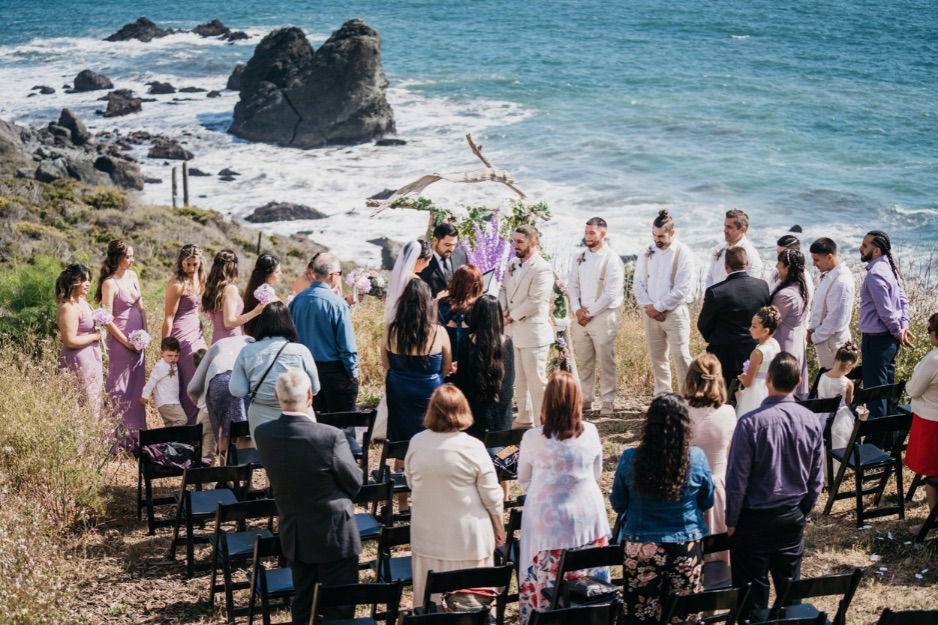An overlooked yet powerful segment of tourism is the destination wedding, which refers to weddings that take place outside of a couple’s region or country of residence. The most popular wedding destinations include Italy, France, Greece, and Mexico, known for their scenic, sunkissed landscapes and cuisine.
This niche is undeniably worth cultivating, as every wedding deal scored is already a jackpot for business in the chosen region, given that they necessarily engage more service providers than the typical tourist would.

Photo by Jude Al-Safadi via Unsplash
First off, overseas couples are more inclined to contract a wedding planner than locals are, according to a 2021 report. This comes as no surprise—it’s more difficult to self-plan from afar, counting hurdles like a language barrier, the quirks of local bureaucracy, the safety and practicality of the surrounding areas of shortlisted venues, on-the-ground logistics, business customs, and other crucial bits of experiential know-how inaccessible to a couple who may have never visited the area before. Now that it’s increasingly popular to DIY nuptials, destination weddings secure customers for wedding planners and organizers based in the area.

Photo by Oxana V via Unsplash
Next, an entire network of photographers, videographers, makeup artists, hair stylists, caterers, florists, venue managers, transportation companies, event designers, and various support staff would also be tapped, boosting job creation in the region.
A 2020 dissertation on Portugal reports that 85% of people who arrive in the country for a destination wedding extend their stays, engaging in touristic activities before or after the wedding. This is especially true for those who have come a long way—they are more likely to spend more time and money to totally maximize the travel opportunity. This creates an impressive chain of profit for the region as the wedding troupe will have different needs from, say, budget backpackers. Another study on Malta reveals that some couples also combine the wedding trip with their honeymoon, further multiplying tourist activity.

If a weekend budget trip could already steal the hearts of travelers, what more a week-long extravaganza with your nearest and dearest? The wedding party will tie priceless memories to your country, exponentially increasing the word-of-mouth promotion mileage, and possibly resulting in a return trip someday.
Since all aspects have to be in sync for a great customer experience, a streamlining effort is encouraged from suppliers. This extends to partnerships with banks to ensure that overseas payment methods will have favorable conditions, waiving large international service fees as these details can make or break the customer experience.

National tourism organizations could also facilitate appropriate accreditation for wedding suppliers and list their contact details in a readily available catalog, so that couples overseas will have the peace of mind in knowing that the services are verified and properly documented, and will be more empowered to choose to wed in your country.
In line with this, establishments in and around wedding hotspots will be incentivized to adopt a world-class standard in improving infrastructure and quality of service. This is a win for area development, and may lead to the increase of real estate value and adjacent economic outcomes.
As weddings become increasingly tied to content production, the influx of social media posts and wedding films will aid your marketing. The couple and guests alike will be posting about the occasion, tagging the venue and suppliers, driving awareness and boosting reach for free. Once the permission to repost is secured from the content owners, you will have a wealth of personal, meaningful material with which to attract further clients.

Lastly, sustaining destination weddings is an important strategy for beating the off-peak slump. While tourists come in droves during popular months—for example, think of Japan’s cherry blossom season in March and April—weddings can come all year-round, depending on how each month is marketed. Besides, crowded touristy weeks are unfavorable for wedding parties anyway. Since the preferences of different couples vary greatly, there are certainly ways to innovatively brand each month as ideal for specific taste profiles.

In conclusion, including destination weddings in the messaging of national tourism campaigns and strategies will be worth it. It’s not just a consequence of successful traditional tourism. Suppliers need support in driving awareness to what they can offer, and couples just need a nudge in the right direction.
To explore the latest trends, expert advice, and breathtaking inspiration in the world of weddings, don’t miss out on the Get Wedded in Australia 2023-2024 digital magazine! Whether you’re a bride-to-be or a wedding enthusiast, this magazine is a must-read.
Below, browse and read your free copy of the Get Wedded in Australia 2023-2024 digital magazine today.

